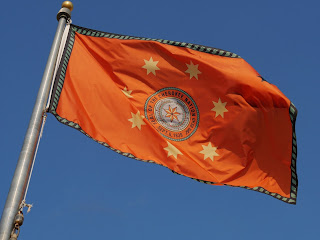Governor Fallin announced her action on two controversial measures passed in the final week of the legislative session. The first was SB 1212, the "Constitutional Carry" bill that would have removed the requirement to pay for a license and take a class in order to exercise your constitutional right to keep and bear arms. Fallin vetoed the measure. SB 1212 passed the House by a vote of 59 to 28, and the Senate by a vote of 33 to 9.
The second was SB 1140, a measure that would protect the religious freedom of non-profit groups to facilitate adoptions consistent with their faith. LGBT extremists
had been pressuring the Governor to veto the bill, but she [surprisingly to me] actually came through and signed it. SB 1140 passed the House by a vote of 56 to 21, and the Senate by a vote of 33 to 7.
Here are her press releases announced the actions she took:
Governor May Fallin Vetoes Senate Bill 1212
OKLAHOMA CITY – Governor Mary Fallin today vetoed Senate Bill 1212, which would have eliminated the requirement to complete a short firearms safety and training course from a certified instructor and demonstrate competency with a pistol before carrying a gun in public. The governor issued the following statement:
“Oklahoma is a state that respects the Second Amendment. As governor, I have signed both concealed-carry and open-carry legislation. I support the right to bear arms and own a pistol, a rifle, and a shotgun.
“Oklahomans believe that law-abiding individuals should be able to defend themselves. I believe the firearms requirement we current have in state law are few and reasonable. Senate Bill 1212 eliminates the training requirements for persons carrying a firearms in Oklahoma. It reduces the level of the background check necessary to carry a gun.
“SB 1212 eliminates the current ability of Oklahoma law enforcement to distinguish between those carrying guns who have been trained and vetted, and those who have not.
“Again, I believe the firearms laws we currently have in place are effective, appropriate and minimal, and serve to reassure our citizens that people who are carrying handguns in this state are qualified to do so.”
Governor Mary Fallin Signs Senate Bill 1140
OKLAHOMA CITY – Governor Mary Fallin today signed Senate Bill 1140, which to the extent allowed by federal law, no private child-placing agency shall be required to perform, assist, counsel, recommend, consent to, refer, or participate in any placement of a child for foster care or adoption when the proposed placement would violate the agency’s written religious or moral convictions or policies. The governor issued the following statement:
“After many hours of consideration and investigation of Oklahoma’s current practice, I note the aggressive efforts that have been made since I have been governor and the substantial progress made in finding more temporary and permanent placements for deserving children, reducing by 21 percent the number of children in state custody. This improvement is due in large part to the successful public-private partnership of more than 50 agencies, some of which are faith-based.
“Under Senate Bill 1140, the state will not be in any way restricting current practice allowing LGBTQ individuals and couples fostering or adopting. It does not ban same-sex adoption or foster care in Oklahoma. Instead, the bill will help continue Oklahoma’s successful placement of children with a broad array of loving families and basically maintain the status quo by setting forth in statute practices which have successfully worked for the best interest of Oklahoma children. I also note that the bill mirrors very similar legislation in Virginia, which has been on the books since 2012 without any court challenges. Since then, five additional states have passed similar legislation. Kansas also has a similar bill before its governor.
“SB 1140 allows faith-based agencies that contract with Oklahoma to continue to operate in accordance with their beliefs. In a day and time when diversity is becoming a core value to society because it will lead to more options, we should recognize its value for serving Oklahoma also because it leads to more options for loving homes to serve Oklahoma children. Other states that have declined the protection to faith-based agencies have seen these agencies close their doors, leaving less options for successful placement of children who need loving parents.
“Finally, I remain committed to preserving the rights of all Oklahomans who are eligible and want to be considered for parenting. Therefore, I plan to direct the Department of Human Services, by executive order, to immediately publish a list of Oklahoma adoption and foster agencies on its website who are willing to serve everyone who meets the Department of Human Services criteria for being a foster or adoptive parent.”




























